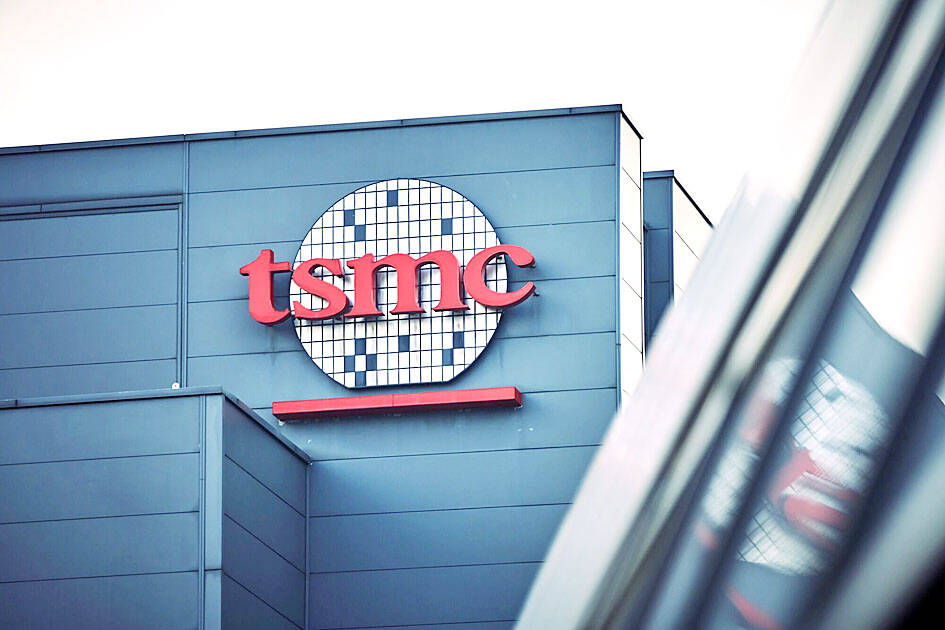Taiwan Semiconductor Manufacturing Co (TSMC, 台積電), the world’s largest contract chipmaker, became the world’s eighth biggest company in terms of market capitalization after a rally in its American depositary receipts (ADRs) on US markets on Monday.
TSMC’s ADRs rose 0.73 percent to close at NT$192.21, boosting the company’s market cap to US$996.8 billion, the eighth highest in the world, passing US-based investment firm Berkshire Hathaway Inc’s market value of US$992.4 billion. Berkshire Hathaway is owned by investment guru Warren Buffett.
TSMC’s ADRs hit an intraday high of US$194.25 on Monday in line with a robust showing by artificial intelligence (AI) chip designer Nvidia Corp, which rose 2.43 percent amid continued optimism toward AI development worldwide, dealers said.

Photo: An Rong Xu, Bloomberg
Yesterday, TSMC’s Taipei-lised shares rose 2.39 percent to close at NT$1,070, pushing up the benchmark TAIEX by 316.75 points, or 1.38 percent, to end at 23,292.04.
TSMC’s gains contributed about 200 points to the TAIEX’s rise and sent the electronics index and semiconductor sub-index higher by 1.89 percent and 2.09 percent, respectively.
“Many investors have embraced high hopes that TSMC will report good results for the third quarter and give impressive guidance for the fourth quarter and the whole of 2024 at an investor conference slated for Thursday, due to the AI boom,” Mega International Investment Services Corp (兆豐國際投顧) analyst Alex Huang (黃國偉) said. “It is possible TSMC will soon test NT$1,080, a closing high seen on July 11.”
“After the TAIEX passed 23,000 points, I expect the main board to soon challenge the historical intraday high of 23,650 points seen on July 17 as TSMC keeps moving ahead,” Huang said. “However, investors should remain alert over possible volatility on Wednesday, when October futures contracts will be settled, as foreign institutional investors still own a large amount of short position contracts.”
Turnover totaled NT$410.35 billion (US$12.75 billion) yesterday on the main board, with foreign institutional investors buying a net NT$33.43 billion of shares, Taiwan Stock Exchange data showed.

SELL-OFF: Investors expect tariff-driven volatility as the local boarse reopens today, while analysts say government support and solid fundamentals would steady sentiment Local investors are bracing for a sharp market downturn today as the nation’s financial markets resume trading following a two-day closure for national holidays before the weekend, with sentiment rattled by US President Donald Trump’s sweeping tariff announcement. Trump’s unveiling of new “reciprocal tariffs” on Wednesday triggered a sell-off in global markets, with the FTSE Taiwan Index Futures — a benchmark for Taiwanese equities traded in Singapore — tumbling 9.2 percent over the past two sessions. Meanwhile, the American depositary receipts (ADRs) of Taiwan Semiconductor Manufacturing Co (TSMC, 台積電), the most heavily weighted stock on the TAIEX, plunged 13.8 percent in

A wave of stop-loss selling and panic selling hit Taiwan's stock market at its opening today, with the weighted index plunging 2,086 points — a drop of more than 9.7 percent — marking the largest intraday point and percentage loss on record. The index bottomed out at 19,212.02, while futures were locked limit-down, with more than 1,000 stocks hitting their daily drop limit. Three heavyweight stocks — Taiwan Semiconductor Manufacturing Co (TSMC, 台積電), Hon Hai Precision Industry Co (Foxconn, 鴻海精密) and MediaTek (聯發科) — hit their limit-down prices as soon as the market opened, falling to NT$848 (US$25.54), NT$138.5 and NT$1,295 respectively. TSMC's

In a small town in Paraguay, a showdown is brewing between traditional producers of yerba mate, a bitter herbal tea popular across South America, and miners of a shinier treasure: gold. A rush for the precious metal is pitting mate growers and indigenous groups against the expanding operations of small-scale miners who, until recently, were their neighbors, not nemeses. “They [the miners] have destroyed everything... The canals, springs, swamps,” said Vidal Britez, president of the Yerba Mate Producers’ Association of the town of Paso Yobai, about 210km east of capital Asuncion. “You can see the pollution from the dead fish.

TARIFFS: The global ‘panic atmosphere remains strong,’ and foreign investors have continued to sell their holdings since the start of the year, the Ministry of Finance said The government yesterday authorized the activation of its NT$500 billion (US$15.15 billion) National Stabilization Fund (NSF) to prop up the local stock market after two days of sharp falls in reaction to US President Donald Trump’s new import tariffs. The Ministry of Finance said in a statement after the market close that the steering committee of the fund had been given the go-ahead to intervene in the market to bolster Taiwanese shares in a time of crisis. The fund has been authorized to use its assets “to carry out market stabilization tasks as appropriate to maintain the stability of Taiwan’s